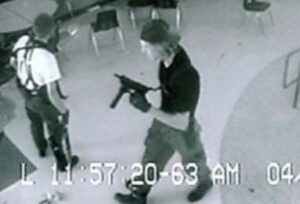
On April 20, 1999, the ordinary rhythms of a spring morning at Columbine High School dissolved into chaos and horror. What began with what sounded like firecrackers and the shuffle of backpacks quickly erupted into the deadliest school shooting the country had seen at that time. At 11:17 a.m., two students, Eric Harris and Dylan Klebold, began their attack armed with shotguns, semiautomatic weapons, and homemade bombs. They were dressed in black trench coats and carried an arsenal of death across the school grounds and through its hallways, moving with eerie calm.
The plan had been much larger. They had intended to detonate two large propane bombs in the cafeteria, hoping to kill 500+ in a single blast. When the explosives failed to go off, they pivoted to hunting down students and faculty with rifles, shotguns, and a TEC-9. Over the course of 46 minutes, they murdered 12 students and one teacher, injuring more than 20 others before turning their guns on themselves in the school library.
In the aftermath, the nation searched desperately for explanations. The two shooters didn’t fit neatly into any category. They weren’t loners. They weren’t bullied more than anyone else. They had friends, part-time jobs, and came from stable, middle-class homes. Yet beneath their suburban normalcy, they had created a private world of hatred and fantasy. They recorded themselves on video, practiced with weapons, and meticulously documented a plan for destruction they called “NBK,” short for “Natural Born Killers”—one of their favorite movies.
Columbine was a seismic event, not just for the body count, but for its psychological impact. The questions it raised were heavier than any one answer could bear. How did no one see it coming? How had they fooled everyone? And why had two seemingly average teenagers become domestic terrorists within the walls of their own high school?
Years later, investigators would describe Eric Harris as a classic psychopath, manipulative and remorseless, while Dylan Klebold seemed to suffer from suicidal depression. But labels offered little comfort. The tragedy left scars on survivors, families, and a national psyche that still twitches when a fire alarm sounds.
Columbine did not end with the final gunshots. It launched an era of lock-down drills, bulletproof backpacks, and a country perpetually asking whether the next shooter is already inside the school.
Additional Content:



Leave a Comment